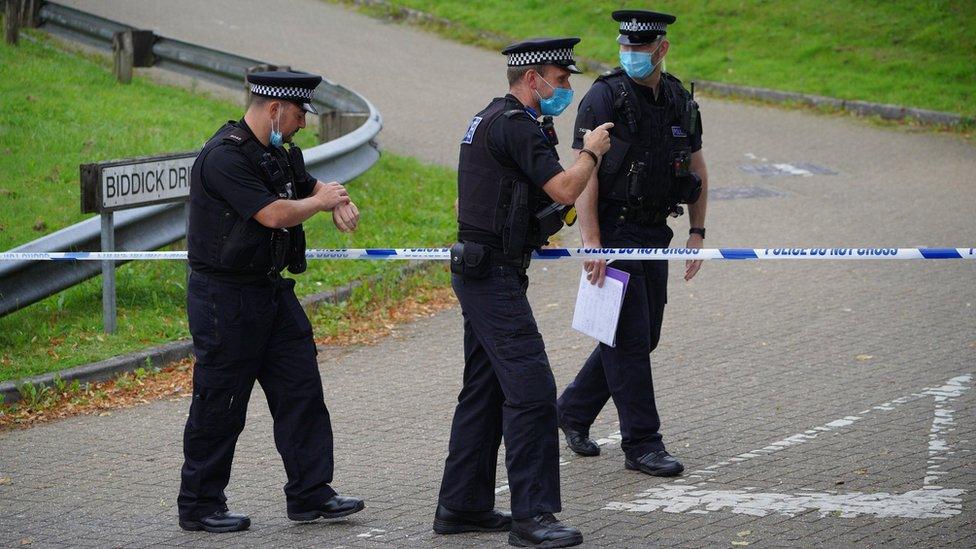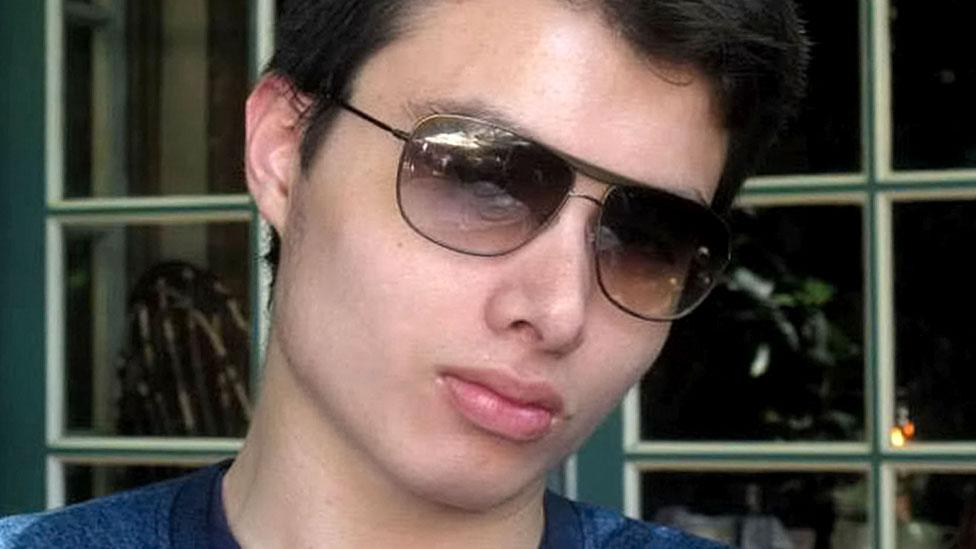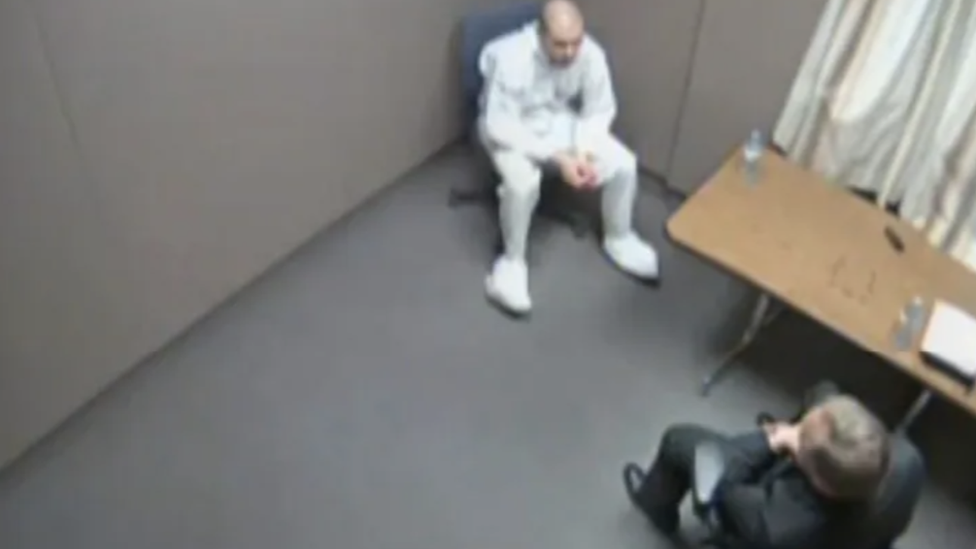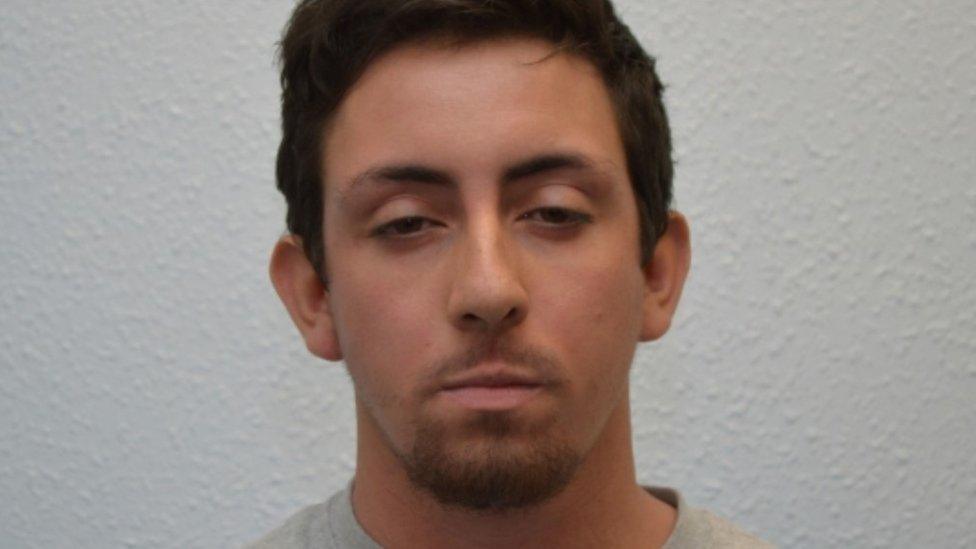Incels: A new terror threat to the UK?
- Published

Why did Jake Davison kill five people in Plymouth? One of the key questions for investigators right now is what, if any, role his belief in "incel" culture played in his murderous decisions.
The movement has been linked to serious violence around the world but, at the same time, experts in security and ideology say it would be wrong to call it a terror group.
Incel is short for "involuntary celibate". People who define themselves as incel say they can't get a sex life despite the fact that they want to be in a relationship.
The idea dates back 30 years and was popularised by a website offering support for lonely people who felt left behind.
But over the years, incel beliefs morphed. Some forums are full of self-pity. Some are now dominated by grievance.
The men taking part express misogyny and an unfulfilled sense of entitlement to sex that women are withholding from them.
Some incels advocate violence against women - and the men who are lucky enough to be in happy relationships.
Florence Keen, who researches incels at the International Centre for the Study of Radicalisation at Kings College London, says that one of the biggest forums has 13,000 active members and around 200,000 threads.
"The caveat I would always give is that we can't say that the whole of the incel subculture is violent," she says.
"It really varies. Some will glorify violence while others [in these forums] will say 'this is not what we are'."
Is it a far-right terrorist ideology?
Many of the followers of the extreme-end of incel culture share conspiracy theory-like views with the far right - and many far-right plotters seem to share an interest in incels - but the two don't always cross over.
In modern far right forums, followers are urged to take the "red pill" - a metaphor for waking up and seeing the world as they say it really is, revealing the secret conspirators who control their lives - whether they are Jews, Muslims or another group.
Many self-professed incels urge followers to take the "black pill" and wake up and see how, they believe, their fate is sealed from birth by forces beyond their control.
Jake Davison used that phrase himself in some of his postings and YouTube videos.
In between complaining about being a virgin, he expressed misogynistic views and suggested that sexual assaults were justified because "women don't need men no more".
In one post, he wrote that incels are "essentially a race of outcasts, abused and forgotten by humanity" who deserve "a better place in society".
"I personally don't think once you live this life you can really ever change," he wrote nine days before the attack. "The damage done, even if you become 'millionaire Chad' tomorrow, I personally believe my scars and damage will follow me forever and I'm sure others feel the same."
What's the link to real world violence?
In 2014, Elliot Rodger shot dead six students at the University of California Santa Barbara, before turning the gun on himself.
He left a message saying that he was dissatisfied with his life because he had failed to form a relationship with a woman - and that in turn had led him to hate those around him who were coupled-up. He explicitly called for violence against women. His two female victims that day, Veronika Elizabeth Weiss and Katherine Breann Cooper, were shot outside a sorority house, a form of social club for women that is common at US colleges. Rodger's suicide note described sorority members as "the kind of girls I've always desired but was never able to have".

In the document Rodger proclaimed: "I am the closest thing there is to a living God"
The core incel themes of self-loathing and grievance transformed into violence.
Florence Keen at Kings College London says that in the years since Elliot Rodger's killings, he has been celebrated as some kind of hero by the extreme end of the incel spectrum - but some of those people may just be lionising him purely to get attention.
"People talk about someone 'going ER'," she says. "But sometimes this is performative."
One man who did want to emulate Rodger was Alek Minassian. He killed 10 people in Toronto. He later told the police that he had been inspired by incel ideas. "I feel like I accomplished my mission," he told investigators.
That dreadful attack led the Canadian authorities to conclude the incel movement was a form of violent extremism, external. Evidence from recent prosecutions in the UK shows that, as things stand, it has not been defined in a court of law as a terrorist ideology.

Alek Minassian: Confessed his motivation to police
How many incel threats have there been in the UK?
Before the Plymouth shootings, the prosecution of Anwar Driouich from Middlesbrough was one of the most prominent British cases.
Driouich was jailed last year for possession of ingredients for explosives and bomb-making manuals used by other terrorist groups.

Anwar Driouich's lawyer said he was a "troubled" man
When he was arrested in 2019, police weren't sure what his ideology actually was. He was obsessed with US shootings and terror attacks and posted on social media that he wanted to carry out a mass murder.
A significant piece of evidence in the case about his mindset was that he visited an incel website and group chat about emulating Elliot Rodger - but prosecutors did not explicitly allege that he was primarily motivated by the movement or a hatred of women.
In another recent case, a jury in Edinburgh convicted 22-year-old Gabrielle Friel of possessing weapons for a terrorist purpose, but it also found that the allegation that his actions were motivated by incel beliefs was not proven.
What's become clear to investigators in both the police and MI5, as they scoop up the social media footprint left behind by the extremists, is how much cross-over there now is among a myriad of splintered extreme ideologies.
As of last September, almost 40% of reports sent to Prevent, the UK's national scheme for identifying people on the verge of violent extremism, were for "mixed ideologies". Incel beliefs were part of the mix.
Assistant Commissioner Neil Basu, the head of UK counter-terrorism policing, told Parliament's Home Affairs Committee: "We don't know whether it is Islamist, or right wing, or left wing extremism or incel or....they are just interested in violence."
Another factor of concern is that many suspects in this group are very young - to all intents and purposes, isolated teenagers spending all of their lives in an online world.
This year a 16-year-old boy from Birmingham admitted three terrorism offences for possessing gun and bomb manuals.
The boy had a general fascination with terrorism, violence and inceldom.
From the age of 11, he had constantly posted in a forum about the Columbine massacre, taking part in disturbing exchanges stating that all women "deserve" to die. The prosecution case was that he did not hold any fixed ideology.

The definition of terrorism in the UK
The use or threat of violence designed to influence the government, an international governmental organisation or to intimidate the public or a section of it
The use or threat of the violence is for the "purpose of advancing a political, religious, racial] or ideological cause"
The violence must be "serious violence" or actions that would endanger someone's life or cause serious damage to property

Should the UK declare incels as terrorists?
So should the UK take the Canadian approach and define incels as a definite threat so those involved would face greater investigation?
Florence Keen at Kings College London cautions against such black-and-white interpretations of a very complex movement.
Just like other radical or extreme movements around the world, she says, not all incel adherents are bent on violence - even if their ideas are at odds with society.
Jonathan Hall QC, the UK's terrorism laws watchdog, has also concluded now is not the time to change the law.
In his most recent report, external, he said that the UK's definition of terrorism - the use or threat of violence to further an ideological cause - was broad enough to prosecute incel-inspired violence.
But he added that not all incel-inspired violence could be considered to be an act of terrorism.
While some incel suspects could be characterised as intending terrorism through a "revolution of the unhappy", others may have similar motives to school shooters in the US: killing for revenge and personal reasons that the rest of us may never be able to understand.